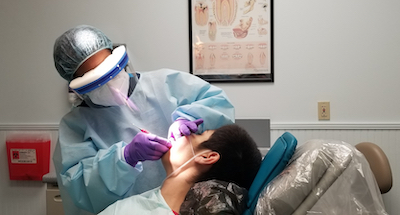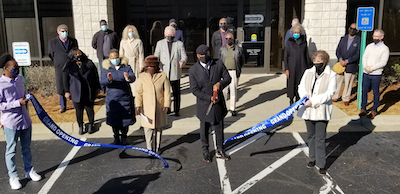Atlanta dental clinic focuses on meeting health care needs of people with developmental disabilities

Deidra T. Rondeno, D.D.S., discovered her passion for providing oral health care to people with developmental disabilities during her general practice residency at Advocate Illinois Masonic Medical Center in Chicago, one of few programs in the U.S. that offer specific training for treating patients with disabilities.
After completing her residency and moving to Atlanta to be closer to family, she took that passion and founded the DDD Foundation Inc., the only private dental clinic in Georgia that exclusively cares for people with developmental disabilities. About 20 years later, the nonprofit has grown to serve 4,800 patients, and it recently moved to a new clinic.
"After my residency, I immediately began looking for a job where I could treat patients with developmental disabilities. I learned that facilities that focus on that community are few and far between," Dr. Rondeno said. "I contacted a state-run clinic and was told that they had just lost their funding and that their facility was closing. I kept wondering what would happen to those thousands of patients who had been receiving dental care at the state-run facility. Where would they go for dental care? That’s when I decided to start my own clinic to treat this population."
People with developmental disabilities face many barriers to receiving oral health care, including a lack of dentists with specialized training to meet their specific needs, she said. In some cases, a disability may affect skeletal structure and musculature of the mouth, jaw, head or neck or behaviors that impact oral health. Some patients may also have other conditions that complicate their care, such as seizure disorders, cardiac disorders, high blood pressure, diabetes or gastroesophageal reflux.
"There are far more patients with developmental disabilities who need care than one dentist can serve," Dr. Rondeno said. "If a dental student or a dentist has an interest in caring for this population, I would encourage them to enter into a residency program or seek out continuing education on serving patients with developmental disabilities, and in particular, conscious sedation training, which some patients need for treatment."
Other barriers are financial, as not all dentists accept Medicaid, which is used by some people with developmental disabilities. Medicaid reimbursement does not cover the entire cost of treatment, and for many of Dr. Rondeno's patients, paying large amounts out of pocket is not feasible, she said. The foundation’s nonprofit status allows her to apply for outside funding to help bridge the gap between what it costs to provide care and what Medicaid reimburses.
Geography can also be a problem for people with disabilities seeking dental care, especially when so few dental clinics specialize in serving this population.
"Many of our patient families travel several hours and spend the night at a hotel prior to the next morning's dental appointment," Dr. Rondeno said.
All of the dentists at the DDD Foundation have received specific training to treat patients with developmental disabilities or have previous experience doing so. The clinic also keeps extensive resources on hand on the 59 different developmental disabilities its patients have.
In addition to the expertise provided by its staff, the foundation also uses the physical features of its clinic to help meet the needs of its patients.
In January 2020, the DDD Foundation learned the Atlanta building where it had been leasing clinic space was being demolished as part of a redevelopment plan and it needed to relocate by the end of the year. After finding a new location about 10 minutes away, the organization held a ribbon-cutting this March, and patients and supporters were invited to participate in the celebration virtually.

Community support was key in making the new clinic a reality. A capital campaign raised the funds necessary for the move and build-out, which involved transforming office space into a working dental clinic.
"Building out a new clinic from scratch allowed us to reimagine our space," Dr. Rondeno said.
The clinic has features that may not be found in other dental settings. For example, its wide hallways and large waiting room are designed to accommodate wheelchairs and stretchers. Each patient treatment room includes a dental chair equipped with EZ Glide technology, which allows staff to move the dental chair when multiple practitioners are needed or when a patient arrives on a stretcher. All procedures, including X-rays, are done in one room, and the clinic has a separate recovery room where a nurse can monitor patients as they recover from conscious sedation.
Compared with the previous clinic, the new space has an additional treatment room, an expanded waiting room for greater wheelchair accessibility, and more cabinet and counter space in its back office and sterilization room.
The DDD Foundation has come a long way since Dr. Rondeno established it as a nonprofit in 1999 and opened the original clinic in 2002 after facing some hurdles.
"Bank after bank denied loans and told me that my idea of having a dental practice that only treats patients with developmental disabilities and who are on Medicaid was not sustainable," she said. "Twenty years later, we're still going strong."
To learn more about the foundation, visit dddfoundation.org.



